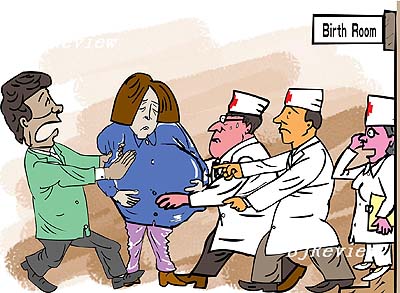|

Li Liyun, a 22-year-old who was in her ninth month of pregnancy, died of serious pneumonia at Chaoyang Hospital in west Beijing on November 21, after her husband refused to let doctors perform a Caesarean section. The hospital had offered to do the operation free of charge but the husband did not believe it.
The husband, Xiao Zhijun, works at a restaurant with a monthly salary of 700 yuan (about $93). In Beijing, a normal spontaneous delivery in a hospital will cost about 5,000 yuan ($676), while a Caesarean costs about 7,000 yuan ($946). The husband said that they came to hospital to treat a cold, not to deliver the baby. At that time, there was one month of pregnancy left before delivery. He believed the hospital should have let his wife recover from the cold and then give birth without the operation.
In accordance with the Administrative Regulations on Medical Institutions, without permission from patients or their family members when the patients are too ill to express their ideas, doctors are not allowed to conduct operations on them.
Finally, because the best time to conduct the Caesarean operation was missed, both the mother-to-be and her baby in womb died.
Li's death triggered a heated controversy among the media and the public. Some believe the husband is to be blamed for the wife's death and others argue that the hospital should take accountability. There are accusations against the current system that forbids doctors to perform surgery without permission from patients or their family members. It is believed that in as serious a condition as Li Liyun was in, the system should have been more flexible in order to rescue the woman's life.
Life outweighs system barriers
Han Han (The Beijing News): In accordance with the Beijing Municipal Health Bureau, Li Liyun's death can't prove the underdevelopment of laws, that is, Li's death should be blamed on her husband.
However, as details to guide social life, laws must also take into consideration the complicated factors in real life and cover all possible situations. Particularly, when it comes to medical emergencies,
"extreme or special" cases should never be excluded from laws and regulations.
Obviously, to ask patients or patients' family members to sign papers before operations, which is stipulated in the Administrative Regulations on Medical Institutions, has loopholes. It overlooks the complicated reality facing different families and grants too much decision-making power to patients' family members.
The original intention to ask the family sign before a surgical operation is to protect patients' rights and interests, but Li Liyun's case shows that the practice is just too rigid to cover emergencies. It is time that relevant clauses in the current Regulations were modified. Meanwhile, in order to prevent hospitals from casually dealing with emergencies, a set of mechanisms to examine the behavior of doctors are necessary.
Yang Tao (www.hebei.com.cn): It is to ensure patients and their families have the right to know and to define the rights and obligations on both sides that relevant regulations say that doctors have to get consent before an operation. Nevertheless, in practice, this regulation is quite questionable. While in most cases, family members will follow suggestions of doctors, in some cases, they do not agree with doctors and then the best chance to save a dying person is missed. In some extreme cases, family members even deliberately want the patient to die. Usually, doctors know much better about the situation than family members do, so in cases when an emergency operation is needed but family members do not agree, the laws must give doctors the right to act.
Since laws have made it possible for family members to decide whether a patient can be operated on or not, then they must be made to shoulder certain responsibilities. Isn't it necessary to punish the decision makers if they insist on not taking emergency treatment after being informed of the dangerous situation or deliberately refuse the treatment? If so, family members will act more cautiously when endorsing medical treatment by hospitals.
Shao Jian (Modern Express): It is a common practice to ask family members to sign before a surgical operation is carried out, but this is a contract within the health sector, not an administrative stipulation. As for this contract, its rationality is still a problem, especially when it's a matter of life and death. In essence, this contract is a measure for the hospitals to protect their own interests.
In common cases, the consent of patients' family members can shield hospitals from possible disputes. However, when it comes to an emergency, if medical workers choose to follow this principle without respect to life, they are actually breaching professional ethics.
| 